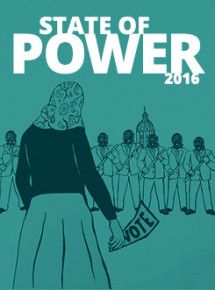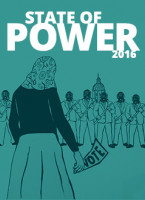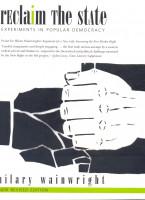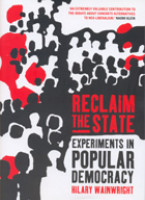Democracy is dead: Long live democracies! Introduction to State of Power 2016
Topics
Building a real democracy in the face of corporate and financial power will require a rethinking of power and agency, unleashing the creative, experimental, knowledge-sharing and emancipatory approaches of social movements.

Downloads
Authors
‘Real democracy now!’, the demand of the Spanish indignados as they occupied the squares of cities across Spain, is the slogan which can best guide us in challenging and escaping the prison of today’s power structures. It was not so much a demand, but a rallying cry to people to act now in creating exemplary democracies, and simultaneously a demonstrative exclamation pointing to what they were doing in occupying the square: experimenting with what real democracy could be here and now.
‘Real democracy now!’ expresses the determined desire of a generation of young Europeans facing a world in which they were brought up to take for granted what they thought was democracy: a society in which dictatorships were past history; in which Apartheid was unacceptable and formal political equality the norm; and in which multi-party democracy and the market had replaced the one-party command economy leading to what was assumed to be democracy in in Central and Eastern Europe.
Political democracy, they had been led to expect, would mean universal human rights to full-time or at least secure employment, a home, and security in ill health and old age. Instead they faced and continue to face a future with only precarious employment and the certainty of debt, without hope of a secure home and a precarious, and sometimes scary, future when they or their loved ones became sick or ill. And they found themselves in a political system in which they were in effect without a voice and in which only the rich have a say, and the interests of the banks and shareholders seeking quick returns predominate over the interests of the majority of people.
Up against financial and corporate tyranny
Several of the essays in this edition of the State of Power report analyse the forms of power that have eroded democracy to produce this dismal future. Walden Bello shows how the corrosive processes at work are not simply the operations of the financial markets as an automatic dynamic unleashed by the dismantling of regulatory regimes; they have been, above all, the outcome of the conscious mobilisation of elite financial and political power to block punishment of corporate crime and regulations of the financial industry demanded by citizens and initially promoted by elected representatives – including Barak Obama.
In this sense, the power of financial capital in the USA and in Europe is fundamentally the same, except that the institutions of the European Union (EU), lacking as they do any significant democratic body – in effect ‘post-democratic’ in their original design, as underlined by Yanis Varoufakis in Chapter 1 – the banksters can operate more effectively behind the scene, influencing governments that have strategic continental power, but without facing any democratic counter-power or force of accountability.
In analysing these processes, Bello, along with Yanis Varoufakis (speaking from negotiating for a society at the receiving end of this financial tyranny), Harris Gleckman, and Leigh Phillips are following the strictures of TNI Board President and author Susan George – which have also been a source of inspiration and guidance for the whole concept of the State of Power Year Book – when she said in How the Other Half Dies (1974):
Study the rich and powerful, not the poor and powerless... Let the poor study themselves. They already know what is wrong with their lives and if you truly want to help them, the best you can do is to give them a clearer idea of how their oppressors are working now and can be expected to work in the future.
This dictum has driven George’s phenomenal output of books that challenge the conventional wisdom about power and help to inspire and intellectually arm those who refuse to accept that elite power is legitimate and who organise to resist it.
Several of the essays in this volume make it clear that their analysis of the powerful leads them to conclude that the institutions of representative democracy are impotent, or have been rendered impotent, in the face of /by the workings of globalised, financialised twenty-first century capitalism. ‘This model [based on parliamentary sovereignty] is finished’, says Varoufakis. Bello concludes by asking whether the failure of the institutions of liberal democracy to promote a counter movement in the aftermath of 2008, to regulate and curb financial capital, might trigger no less than a fundamental reconfiguration of society’s relation to finance capital, indeed, to Capital itself. They converge, more or less, around a common view that deeper, more effective forms of democracy need to be developed. Some point to how these are being developed out of or closely tied to very different kinds of grassroots resistance (Kothari and Das, Postill, George and Gutiérrez). Varoufakis sketches out the attractive possibility for Europeans of an open and not exclusively party-based alliance of all those who want to work for a democratised Europe, regardless of party affiliation.
The problem of counter power and the power of the oppressed
While Susan George assumes resistance on the part of the oppressed she does not discuss forms of counter power in the context of challenging the powerful. Indeed, she refers to the poor as ‘the powerless’ – which was entirely understandable in 1974 when there were still real grounds, at least in Europe and North America, for believing that parliamentary democracy was genuinely more or less able to connect citizens and their grievances with government, and that political leadership was more or less responsive to popular protest. Moreover, the widespread assumption was that popular protest could turn resistance into political pressure – sometimes through political parties in which there was still genuine debate and limited but significant channels of influence.
In 2016 we face a new situation, or one could argue a new level of a process that was first marked by the revolts of 1968, to which I will briefly return.
When democracy, through systems of representation, persistently fails, we have to return, in theory and in practice, to the basics, to the demos. Yes, as Susan George implies, the demos are without state power, kratos. And as Varoufakis says, the establishment wishes them to remain so; it has, as he puts it, ‘contempt for democracy’. But though the institutions of representation have emanated mainly from those who already were in state power and aimed mainly to limit the encroachments of the demos, they have nevertheless been struggled for and have hinged on the franchise. ‘One man, later one person, one vote’ came to encapsulate democracy. Universal suffrage was understood as both the necessary and the sufficient conditions for popular power.
However, as critics of liberal democracy – from Tom Paine through Marx to C.B. Macpherson, C. Wright Mills and Ralph Miliband – have argued, there is a crack in the foundations of liberal democracy. This flaw is not necessarily terminal, but in circumstances of financialised capitalism it produces further cracks at every level.
The flaw is that so long as the goal of democracy is applied only to political power, understood as separate from economic power, then universal franchise provides only an abstract, formal political equality in a society that is fundamentally unequal. And the more unequal society becomes, the more empty formal political equality appears and the greater the level of disgust with parliamentary politics. Levels of economic equality in the past decade have been at record levels; at the same time we have seen with the indignados, the Arab Spring and Occupy, an unprecedented burst of militant experimentations with new, intentionally more radical and participatory forms of democracy. While these experiments produced no single lasting model, experiences of this mass refusal have led to new innovations – as in Spain, with the new political party Podemos. And their collective self-confidence has been transnationally infectious. For example, the Radical Independence Campaign in Scotland drew some of its inspiration from these international examples for a bold campaign for a ‘yes’ vote as an opportunity to radically rethink the institutions of Scottish political economy.
This fundamental limit to parliamentary democracy can be understood best by remembering the historical context of the early struggles for the vote in the nineteenth century. In this period, perhaps most notably in Britain, many property-less men and women and their allies struggled for the vote, imagining that exposing, challenging and overcoming unequal and exploitative economic relationships would be at the heart of parliamentary politics. For the Chartists and many suffragettes, the vote was the opening of a new phase in this fused political and economic struggle, not a plateau, let alone a separated political plateau on which to remain. Political ‘representation’ meant for them a means of ‘making present’ in the political system struggles for social and economic inequality.
The ability of the British establishment, often with the complicity, tacit and overt, of the Labour Party’s parliamentary and trade union leaderships, to contain this potential dynamic is only one well documented example of a phenomenon common in different forms to liberal democracies. The result has been a narrow form of representation in which citizens are treated as individuals in an entirely abstract way rather than as part of embedded social, and (increasingly) unequal, relationships. It is a political process which consequently tends to disguise rather than expose inequalities, or worse still, to re-interpret inequality as the fault of those with less power – and to punish them for it; and generally protects rather than challenges private economic power.
Simultaneously, with this obfuscation of the real relations of economic power, the separated processes of political representation also disguise the dependency, especially but not only economic, of the powerful on those whom they exploit or oppress. In his essay on precarity, Tom George highlights this dependency in the service economy with the example of the always-available temporary staff agency ‘Kelly Girl’. This also means, however, that the supposedly powerless, beneath the surface of their acquiescence, actually have levers of power; first, the power of refusal and protest but potentially the power at least to begin to create alternatives.
The power of ‘the powerless’
In this context, Susan George’s observation becomes important not only to expose injustices of elite power and its exercise, but also as the starting point for identifying how to develop counter power. In other words, when inherited but flawed mechanisms/institutions for calling the powerful to account have been rendered all but useless, what other or new sources of power do people have – those at the receiving end of the powerful’s actions – as a result of their being indispensable to the powerful? To answer this question, we need to investigate exactly how power works.
To put it in the terms of another political analyst and former British MP, Tony Benn, who famously said:
There are five questions to ask about the powerful:
• What power have you got?
• Where did you get it from?
• In whose interests do you exercise it?
• To whom are you accountable?
• How can we get rid of you?
In the light of how limited the powers have become of the parliamentary institutions in which Benn so strongly believed and whose strength he was committed to restoring, there are two further questions raised by the essays in this book.
• How does your power (the power of the elite) depend on our acquiescence to (and reproduction of) it?
• How do you retain your power? How do you get away with what you do?
Benn’s questions arose from direct experience of government in the 1960s and the 1970s and from the sense this gave him, that representative democracy was not all it claimed to be in terms of holding power to account. He observed then how sources of power accountable to no one beyond their own shareholders - banks, financial institutions, multinational corporations, media magnates – were wielding increasing and troubling power. Forty years later we see this strangling of democracy before our very eyes.
The search for new sources of power
One response to this is to stiffen the resolve of our representatives and more significantly to internationalise representative democracy, as suggested by Leigh Phillips, but more common is the experimental (including the exploration of historical experiments) search for new sources of power. The essays of Gutiérrez, Postill and George and also, using a more historical perspective, of Kothari and Das, all point to significant examples of people working collectively to create social, economic, cultural and often political power, especially at a local and municipal level.
To understand the potential significance of these new and as yet insufficiently recognised forms of power, two theoretical foundations need to be laid: the first is laid out here by Elaine Coburn in her critique of the separation of the economic and the political, for the way it provided ideological legitimation of liberal democracy and separated political procedures from material realities and economic power relations of citizens.
The second analytic foundation concerns a distinction between different forms of power.
Two forms of power
On the one hand, there is ‘power over’ which could also be described as power-as-domination, involving an asymmetry between those with and those over whom power is exercised. On the other hand is ‘power to’, ‘power to do or transform’ or ‘power-as-transformative-capacity’. This is the power discovered by social movements as they move beyond protest to proposing practical, prefigurative solutions, from the student movements to the radical workers’ movements to the feminist movements.
Frustrated by the workings of power-as-domination exercised by political parties of the traditional Left, these movements took power into their own hands, discovering through collective action various capacities to bring about change. This included women seeking to change their relations with men and with each other, workers collectively improving their working conditions and extending control over the purpose of their labour as well as community movements blocking eviction or land speculation and campaigning for alternative land-use policies for the wellbeing of their communities.
The distinction between the two forms of power is, I would argue, central to the search, illustrated in the essays of Postill, Gutiérrez , George, Kothari and Das, for appropriate forms of transformative democratic political organisation in a context of extreme fragmentation, precarity and dispersion of working people, whether in the Indian sub-continent or among the precarious ‘cybertariat’ of the Southern and, more recently, Northern hemispheres. It is a search stimulated by the failures of the traditional parties of the Left to bring about the changes in which their supporters had believed and for which they had worked.
Moreover, it is a search taking place simultaneously with attempts by the ruling, market-dominated, order to appropriate and individualise the emancipatory aspirations of social movements. This attempted appropriation produced extensive ambivalence amongst movements in the 1960s and 1970s – over issues from gender and sexuality through to education and health – between personal freedom through market choice and money on the one hand, and individual self-realisation through collaboration and solidarity in producing a good life for all, on the other. Take for example the women’s liberation movement, whose language has been shamelessly plagiarised by commercial advertising to promote, bras, tampax , deodrants, and cars with images and slogans that evoke 'liberation', 'emancipation' and 'freedom'. Gay and lesbian liberation is both a market (as we see with the commercial celebration of the pink pound) and a political culture, and inspiration to political action (see the strong welcome given to Pride, the film celebrating the role of the gay liberation movement in solidarity with the 1984/5 miners’ strike). The question of what are the conditions for individual realisation through mutuality as distinct from through money and the capitalist market is a theme that will recur as the socially destructive consequences of neoliberal politics becomes clear.
Historically, social-democratic and communist parties have been built around a benevolent version of the understanding of power-as-domination. Their strategies have been based on winning the power to govern and then using the ‘levers’ of the state apparatus paternalistically to meet what they identify as the needs of the people. The term ‘paternalistically’ is used here to highlight the social relations involved in the benevolent exercise of power-as-domination: as with the traditional power of the father over the child, the assumption is the inadequate capacity of the people to govern themselves.
The emergence of power-as-transformative-capacity had its contemporary origins in the rebellions of the late 1960s and early 1970s. A central and common theme of these rebellions was a challenge to all conventions and institutions based on deference to authority. The other side of the movements’ rejection of these forms of authority was a pervasive and self-confident assertion of their own collaborative capacity.
Along with this self-confidence in their transformative abilities went inventiveness about forms of organisation that would build that capacity. While acknowledging the mixed and uneven legacy of the 1960s and 1970s, the distinctive legacy of these movements, that can help us understand power-as-transformative-capacity, was their tendency to emphasise the valuing and sharing of different kinds of knowledge: practical and experiential as well as theoretical and historical. In their refusal to defer to authority, they broke the unspoken bond between knowledge and authority – the idea that those in power knew best, including what was best for you. The uncertain, experimental process of democratising knowledge, in practice, usually involved an emphasis on decentralised and networked organisational forms, sharing and developing knowledge horizontally and breaking from models that presumed an expert leadership and a more-or-less ignorant membership.
These radically democratic approaches to knowledge laid the organisational and cultural foundations that have underpinned social movements ever since, from the alter-globalisation movement of the late 1990s through to Occupy and the indignados. The emphasis on sharing knowledge and decentralisation also helped to create the conditions for the web – born as it was of the Californian counter-culture of the late 1960s though realised through the genius of Sir Tim Berners-Lee, based in another technological research hub in Geneva and himself driven by the knowledge-sharing aspirations stimulated by the rebellions of the 1960s. This pre-history created a receptivity towards, and creativity with, techno-political tools in the evolution of transformative political organisation and a convergence between generations of activists. The essays of Gutiérrez and Postill highlight the significance of the use of these techno-political tools in confluences between different social movements and emancipatory political traditions.
Changing nature of political agency
A question that will permeate debates and practical experiments in developing counter power throughout 2016 and beyond, is how far, and under what conditions, power-as-domination (essentially having control over state institutions, national and municipal) can be a resource or a source of facilitation for power-as-transformative-capacity. In other words, although there is a sharp distinction between these two types of power, they are not necessarily counter-posed. Power-as-domination can in theory combine with or be a resource for power-as-transformative-capacity. For example, a change in the balance of power in society – often due in part to the widespread exercise of transformative capacity – can lead to progressive control over the state or progressive shifts within governing parties, which can in turn lead to some form of governmental support for a transformative movement.
Examples of this are evident with the political repercussions of feminism: in the UK, the cultural and social changes brought about by the pervasive impact of the women’s liberation movement led to the Equal Pay and Anti-Discrimination Acts of the late 1970s and also to City Council initiatives to create Women’s Centres, Rape Crisis Centres, an expansion of community nurseries and other public facilities responding to women’s needs. These political achievements and the resources of both legal legitimacy and a redistribution of public resources in favour of women, in turn strengthened women’s capacities to bring about further change.
In other words, political facilitation of the autonomous exercise of transformative capacity can lead to deep social changes of a kind that governments or municipal councils on their own, however radical their intent, are incapable.
The character of political agency is complex and plural and its form necessarily varies according to the context and purpose – an election campaign entails a different kind of democratic organisation from that involved in the running of a women’s centre.
Historically, the dominant view on the relationship between social movements and political parties was that leftist parties should be the voice of movements whose objectives they shared. A classic example is the Green Party, founded in the 1970s to give the growing anti-nuclear movement and the associated environmental consciousness a political voice. Experiences since of movements like feminism and workplace trade unionism with a strong sense of their autonomy and of political movements-cum-parties like the Workers’ Party (Partido dosTrabalhadores, PT) in Brazil, the African National Congress (ANC) in South Africa and Akbayan in the Philippines led to a recognition that many of the kinds of change that social movements were working for, and the kinds of knowledge, organisation and timetable that they needed are quite different from the imperatives of a political party engaged in electoral politics. Moreover, experience taught that movements’ organisation and objectives could easily be compromised if they were subordinated to the imperatives of electoral timetables and disciplines and did not preserve an essential autonomy.
Political organisations, whether political parties or a new kind of political movement, are being experimented with and do not assume that they, through their national electoral aspirations, are the supreme voice of transformative politics. Such organisations tended to see their role as being or aiming to open up the resources of government office with different kinds of agency, whose transformative capacity lies in their roots in society. There is no single fully formed illustration of this – only emerging local experiences like Barcelona En Comu and other urban confluences brought to our attention here by Gutiérrez, or visions of an open, outward-reaching transnational alliance sketched here by Varoufakis.
Such projects are by their very nature fraught with tensions. One flows from the very different conceptions of knowledge underpinning our dominant, and dominating, political systems, and those being generated through the pragmatic day-to-day resistance of social movements. Politics, or rather political parties, seem to have an inherent tendency to close in on themselves - maybe in search of traditional forms of certainty, and linked to this predictability and with it a controlling, monopolistic conception of agency. The innovations, enhanced by the new information and communication technologies, of the new movements (culturally rooted in the 1960s’ break of the historic bond between knowledge and authority), has been an ability, creatively to deal with uncertainty, to let go of control without losing the possibility of collaborative agency on the basis of shared principles and a broadly agreed purpose. These essays are intended as an intellectual resource for negotiating this uncertainty with all the critical faculties, openness, curiosity and pluralism that this entails. In other words, democracy is dead! Long live democracies!




